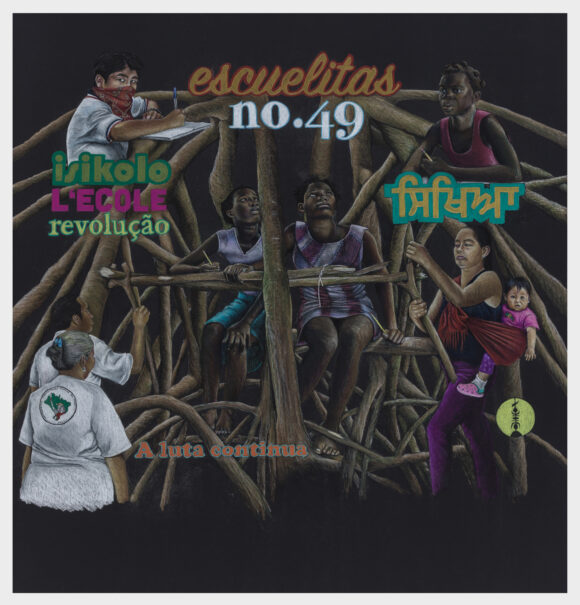 Third World Liberation Mixtape (Escuelitas) by Shellyne Rodriguez
Third World Liberation Mixtape (Escuelitas) by Shellyne Rodriguez
In the series Third World Liberation Mixtape, and specifically in Escuelitas, Shellyne Rodriguez illustrates the themes animating this issue–Black geographies, abolitionist education, and internationalism from below. A radical artist and teacher from the diasporic convergence space that is the Bronx, Rodriguez rehearses internationalism from below by depicting comrades from anti-colonial struggles such as the Brazilian MST (Movimento dos Trabalhadores Rurais Sem Terra) in a mangrove school like those used by the PAIGC (Partido Africano para a Independência da Guiné e Cabo Verde) for militant education. In these schools of the revolution, people come together to think and theorize, study and strategize, so that the struggle may continue. These revolutionary escuelitas are emancipation in rehearsal.
Volume 9/Issue 1, Fall 2024
Editorial Introduction to Special Issue – Black Geographies and Transdisciplinary Abolitionist Education: Lifting Up Interlocking Struggles to Create Radical Possibilities by Mieasia Edwards and Lucien Baskin
Constructing Livable Futures: An Analysis of the Possibilities of Black Community-based Educational Resistance by Imani Wilson
Survival Until Revolution: Mandatory Reporting, Anti-Blackness and Education by Alia, Ayla Gelsinger, Charity Hope Tolliver, Erica R. Meiners, Erin Miles Cloud, Jasmine Wali, Shannon Perez-Darby, Shawn Koyano, Van, and Alexis Nicole Neely
Mobilizing Destruction: Militant Decolonial Education to Organize Vulnerable Populations and Reduce Risk to Disasters by Charles Overton
Where Is My Freedom? by Adrian Edmundson (Kyoshabire Adrine)
Youth as Urban Alchemists: Engaging Black Geographies, Learning and Design by Kaleb Germinaro
What Makes this Child Arrestable? by Gabrielle Warren
An Invitation: Slowing Down Time and Nurturing Relationships within a School Abolition Political Education Group by Jenna Queenan and Pam Segura
Labor and Completion by David A. Maldonado
Abolitionist University Studies: A Provocation by Conor ‘Coco’ Tomás Reed
Black Lives Matter in Higher Education: Empowering Student-Scholar Voices by Cynthia Tobar
Dear White America and other poems by Travis Richards
Picturing Refusal: How a Multimodal, Collaborative Assignment Allowed a Teacher Education Class to Develop Abolitionist Pedagogies by Kushya Sugarman
Whip to Baton? by Cinnamon Williams
Collective Drawing as Liberatory Method: An Abolitionist Toolkit for Community Meaning-Making, designed with CareNotCops by Sophie Plotkin, Samhitha Krishnan, Kelly Hui, and Neomi Rao
Community Violence Intervention & Prevention Strategies: Mitigating Variations in School and Neighborhood Violence by Asia. S. Ivey, Mia Karisa Dawson, & Shani Buggs
Keep that Horizon as Broad as Possible: A Community Conversation on Abolitionist Praxis in Education by Atasi Das, Brian Jones, Edwin Mayorga, and Robert P. Robinson with Jordan Bell and Karen Zaino
Rehearsing Possibility on 52nd Street: The Gathering Plot of Malcolm X Park by Christopher R. Rogers
Everyone Prays in the End: Emancipating Generational Trauma Through Narratives of our Mothers by Darius Phelps
Examining Transformative Ruptures in Education through Abolition as Presence & Black Livingness by Lucien Baskin and Mieasia Edwards
Notes on Contributors
 Third World Liberation Mixtape (Escuelitas) by Shellyne Rodriguez
Third World Liberation Mixtape (Escuelitas) by Shellyne Rodriguez

